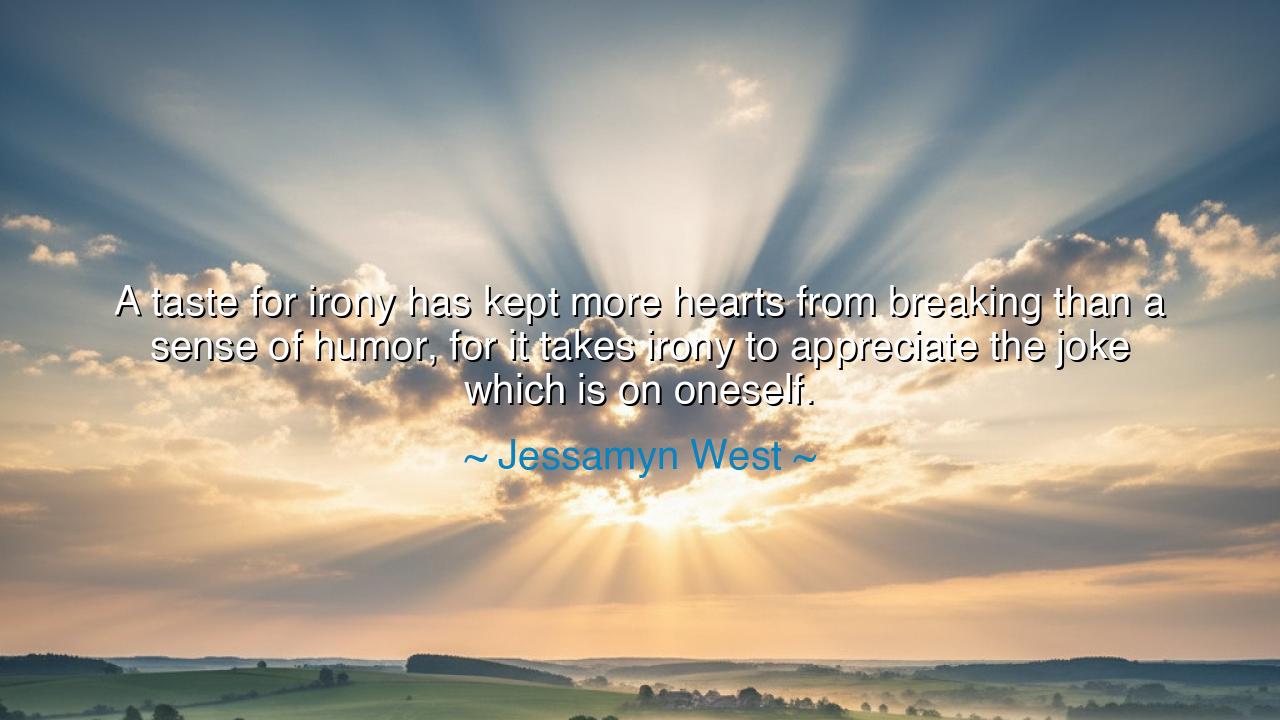
A taste for irony has kept more hearts from breaking than a sense
A taste for irony has kept more hearts from breaking than a sense of humor, for it takes irony to appreciate the joke which is on oneself.






Hearken, children of the ages, and listen to the wisdom of Jessamyn West, who spoke: “A taste for irony has kept more hearts from breaking than a sense of humor, for it takes irony to appreciate the joke which is on oneself.” Understand this: while humor delights and binds men together, it is irony that tempers the soul, that shields the heart from despair, and that allows a man to endure the weight of his own flaws without succumbing to sorrow. For it is in the recognition of one’s own imperfections, met with a knowing, gentle laughter at oneself, that true resilience is born.
In the annals of antiquity, the philosophers of Athens understood this deeply. Socrates, with his Socratic irony, exposed the ignorance of others and yet displayed a serene acknowledgment of his own limitations. By embracing the irony inherent in his own pursuit of wisdom, he transformed potential humiliation into enlightenment. It is this reflective taste for irony that preserves the heart, allowing one to confront folly, failure, and misfortune without the soul shattering under its weight.
Consider the life of Abraham Lincoln, a man who faced profound personal grief and the crushing burdens of a nation at war. Friends and historians alike noted his frequent self-deprecating remarks, his capacity to recognize the ironies of his own condition. Through this taste for irony, Lincoln softened the harsh blows of circumstance. He could see the joke that life had played upon him, and in doing so, he fortified his spirit, preventing sorrow from consuming him. In irony, he discovered a medicine that laughter alone could not provide.
Even in the world of letters, irony has been a shield and a balm. Jane Austen, whose novels reveal the follies of her society, often directed her wit inward as much as outward. She understood that the true power of irony lies in self-recognition: to see the absurdity of one’s own pride, pretension, or desire is to gain mastery over it. Irony, in this sense, becomes a mirror for the soul, preserving the heart from the breaking forces of life by teaching humility, patience, and reflection.
History teaches another vivid lesson in irony. During the Great Depression, Charlie Chaplin, through the character of the Tramp, depicted the harsh realities of poverty and injustice. Yet beneath the comedy lay a subtle recognition of life’s ironies—the ways in which society mocks and marginalizes the weak, the ways in which the individual’s plight becomes a stage for unintended absurdity. In this recognition, audiences laughed not only at the character but also with themselves, finding in irony a comfort that mere humor could not provide.
Yet, the wisdom of West is subtle. To cultivate a taste for irony is to cultivate the capacity for self-awareness, to perceive one’s own position in the tapestry of life with clarity and courage. It is to acknowledge that life often places us in situations where we are the subject of the joke, and to meet this with grace, understanding, and even amusement. This skill strengthens the heart far more deeply than mere laughter, for it fosters endurance, perspective, and humility.
Children of the ages, the lesson is clear: develop the habit of seeing your own flaws and missteps with gentle irony. Observe the contradictions, mistakes, and absurdities that life presents, and allow yourself to be amused by your own foibles. In this practice, your heart gains resilience; you are less likely to break under the pressures of circumstance, and more likely to find wisdom in life’s ironies.
Practical action follows naturally. Keep a journal of your own misadventures, reflect upon them with honesty, and allow the subtle spark of irony to temper your responses to failure. Speak to yourself with gentle acknowledgment rather than harsh condemnation. Share stories that illuminate your own imperfections, not to invite ridicule, but to cultivate perspective and connection. In this way, you learn, as West teaches, that a taste for irony preserves the heart, fortifies the spirit, and allows one to face life’s trials with a courage that humor alone cannot achieve.






AAdministratorAdministrator
Welcome, honored guests. Please leave a comment, we will respond soon